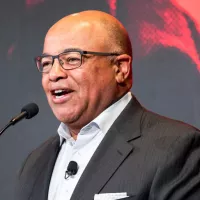New York Times Co. v. Sullivan (1964) is a landmark Supreme Court case establishing the "actual malice" standard for defamation claims brought by public officials. To win such a case, the official must prove that the publisher knew the statement was false or acted with reckless disregard for its truth. This ruling significantly protects freedom of speech under the First Amendment by limiting the ability of public officials to sue for libel, ensuring robust debate on public issues without fear of crippling lawsuits.
1948: Louis M. Loeb Becomes Chief Counsel to the Times
In 1948, Louis M. Loeb became chief counsel to The New York Times.
March 29, 1960: Publication of 'Heed Their Rising Voices' Advertisement
On March 29, 1960, The New York Times published a full-page advertisement titled "Heed Their Rising Voices" that solicited funds to defend Martin Luther King Jr. The advertisement contained some inaccuracies regarding events involving the police force of Montgomery, Alabama.
1960: Publication of Advertisement and Lawsuit
In 1960, The New York Times published an advertisement supporting Martin Luther King Jr., leading to L.B. Sullivan suing the Times for defamation based on factual errors. The Alabama county court jury returned a verdict in favor of Sullivan.
August 30, 1962: Alabama Supreme Court Affirms Verdict
On August 30, 1962, the state supreme court affirmed the verdict, stating that "The First Amendment of the U.S. Constitution does not protect libelous publications".
March 9, 1964: Supreme Court Decision in Favor of the Times
On March 9, 1964, the Supreme Court issued a unanimous 9–0 decision in favor of The New York Times, vacating the Alabama court's judgment and limiting newspapers' liability for damages in defamation suits by public officials.
March 1964: Supreme Court Overturns Alabama Court's Verdict
In March 1964, the Supreme Court unanimously held that the Alabama court’s verdict violated the First Amendment. The decision reduced financial exposure from defamation claims and frustrated efforts to suppress political criticism. The Court extended Sullivan's higher legal standard for defamation to all 'public figures'.
1964: Landmark Supreme Court Decision
In 1964, the U.S. Supreme Court ruled in New York Times Co. v. Sullivan that the First Amendment limits the ability of public officials to sue for defamation, establishing the "actual malice" standard. The New York Times Co. v. Sullivan decision is frequently ranked as one of the greatest Supreme Court decisions of the modern era.
1967: End of Louis M. Loeb's Tenure as Chief Counsel to the Times
In 1967, Louis M. Loeb's tenure as chief counsel to The New York Times came to an end.
1997: Theophanous Overruled in Australia
In 1997, in Australia, Theophanous v. The Herald & Weekly Times Ltd was overruled by the High Court of Australia in Lange v Australian Broadcasting Corporation.
2014: 50th Anniversary Editorial by The New York Times
In 2014, The New York Times released an editorial on the 50th anniversary of the New York Times v. Sullivan ruling, reflecting on the state of press freedom and hailing the decision as the "clearest and most forceful defense of press freedom in American history."
2015: Time Magazine Survey on Best Supreme Court Decision
In 2015, a Time magazine survey of over 50 law professors named New York Times v. Sullivan "the best Supreme Court decision since 1960," noting its contribution to free speech and criticism of the powerful.
2016: Donald Trump Calls for Changes in Libel Laws
Starting in 2016 and continuing through his presidency, Donald Trump called for changes in libel laws, particularly taking issue with reporting from The New York Times.
2018: Trump Takes Issue with Bob Woodward's Book
In 2018, Donald Trump took issue with the content of Bob Woodward's book, Fear: Trump in the White House, and called for changes in libel laws.
2018: Steve Wynn Files Defamation Lawsuits
In 2018, Las Vegas casino owner Steve Wynn filed defamation lawsuits against the Associated Press, claiming actual malice in their reporting on allegations of sexual assault.
2019: Justice Thomas Advocates Reevaluating Sullivan
In 2019, Supreme Court Justice Clarence Thomas advocated reevaluating New York Times v. Sullivan in an opinion attached to the court's denial to hear a libel case brought by Katherine McKee against Bill Cosby.
2020: Donald Trump Calls for Changes in Libel Laws
In 2020, during his first presidency, Donald Trump continued to call for changes in libel laws.
March 2021: Judge Silberman Calls for Overturning Sullivan
In March 2021, federal judge Laurence Silberman called on the Supreme Court to overturn New York Times v. Sullivan, accusing The New York Times and The Washington Post of being "virtually Democratic Party broadsheets."
2021: Justice Thomas Repeats Calls to Review Sullivan
In 2021, Justice Thomas repeated calls to review New York Times v. Sullivan in his dissent in Berisha v. Lawson and in his dissent to the court's denial to hear Don Blankenship's appeal. Justice Neil Gorsuch joined in Thomas in Berisha in expressing his concerns of how the media landscape had changed since Sullivan.
March 19, 2023: The New York Times Reviews the Original Case
On March 19, 2023, The New York Times published a story reviewing the original advertisement and the legal case of New York Times v. Sullivan.
2024: Value of Original Damages Adjusted for Inflation
In 2024, the $500,000 in damages awarded to Sullivan in the original case is equivalent to $5.26 million when adjusted for inflation.
February 2025: Wynn Petitions Supreme Court to Overturn Sullivan
In February 2025, Steve Wynn petitioned the Supreme Court to hear his case, asking them to overturn the "actual malice" standard of the New York Times v. Sullivan decision.
March 2025: Supreme Court Declines to Hear Wynn's Case
In March 2025, the Supreme Court declined to grant certiorari to Steve Wynn's case, leaving the "actual malice" standard of New York Times v. Sullivan intact.
Mentioned in this timeline

Donald John Trump is an American politician media personality and...

Martin Luther King Jr was a pivotal leader in the...

The White House located at Pennsylvania Avenue NW in Washington...

Inflation in economics signifies an increase in the average price...

Las Vegas Nevada's most populous city and the seat of...
Australia officially the Commonwealth of Australia encompasses the Australian mainland...
Trending

1 hour ago Mike Tirico's Inspiring Olympic Sign-Off: A Look at His Legacy in Sports Broadcasting.

1 hour ago Benny Blanco's Dirty Feet Video Sparks Internet Outrage and Divorce Suggestions for Selena Gomez.

1 hour ago Rock & Roll Hall of Fame Announces 2026 Nominees: Mariah, P!NK, Wu-Tang Clan Lead

1 hour ago Matthew Lillard Responds to Quentin Tarantino's Criticism, Appreciates Hollywood's Support After Feeling 'Punched'

2 hours ago New Jersey Schools impacted as a major blizzard brings record snowfall.
2 hours ago Rugby Property Assets acquires Cavendish Walk Shopping Centre in Merseyside for £1.5m.
Popular

Jesse Jackson is an American civil rights activist politician and...

Susan Rice is an American diplomat and public official prominent...

Barack Obama the th U S President - was the...

Michael Joseph Jackson the King of Pop was a highly...

XXXTentacion born Jahseh Dwayne Ricardo Onfroy was a controversial yet...

Bernie Sanders is a prominent American politician currently serving as...
